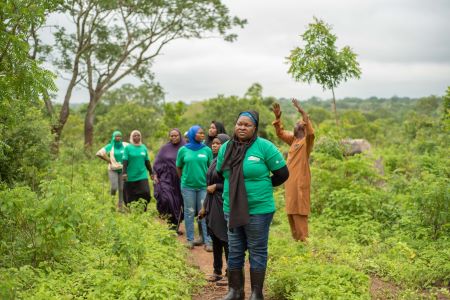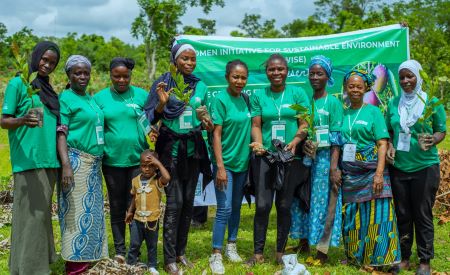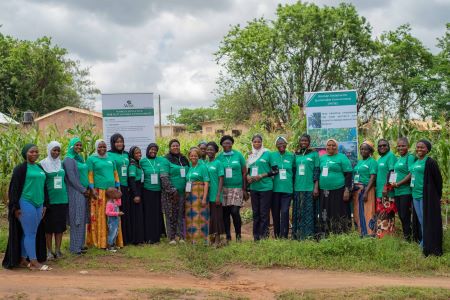Yahuza Bawage
In 2004, armed with a degree in Urban and Regional Planning, Olanike Olugboji-Daramola, who since childhood was passionate about sustainable environment, started the Environmental Management and Protection Network, a non-profit organization that unites individuals and organizations already committed to promoting environmental sustainability and effective waste management. This initiative sought a coordinated and harmonized approach to environmental intervention efforts.
As someone who has a deep connection with the natural environment, Olanike had it in my mind that someday when she grows up, she will find a way to teach people how to take care of the environment. “I have always wanted to bring people together and make them live in harmony with nature while promoting a clean and sustainable environment,” she said.

As Olanike continued to address environmental challenges through the organization, she became increasingly aware that women in grassroots communities were the most severely affected.
In response to this pressing issue, the organization underwent a significant transformation in 2008 and was renamed the Women Initiative for Sustainable Environment (WISE). This strategic change reflected a focused commitment to empowering and supporting women in their efforts to promote environmental sustainability.

“The transition was actually to involve the realities of the women that were at the frontline of the impact of environmental challenges,” Olanike noted.
WISE as an organization and enterprise, works towards advancing constructive environmental practices by empowering women and youth to become environmental and community stewards. Over the years, the enterprise has been involved in strengthening the roles grassroots women play in community resource management.
“We have worked for years to mobilize disadvantaged women especially in Kaduna State, Nigeria, to address several environmentally destructive cultural practices in water and food supply, energy services, natural resource access, education and waste management issues,” Olanike noted.
While the organisation champion programs that deliver environmental awareness, training and advocacy on climate change, conservation, energy, solid waste management, and food and water security, it also teach peace and conflict resolution, leadership education, Financial Literacy, micro-entrepreneurship, citizen journalism, as well as digital empowerment.
Additionally, it lobbies individuals, governmental and intergovernmental bodies, NGOs, community-based organizations and other individuals and corporate organizations to develop environmentally sustainable initiatives that socially and economically empower women and young people.
A tree planting initiative
Between 2021 and 2022, WISE successfully implemented the “Tree Growing Enterprise for Food Security and Climate Change Mitigation” project. Funded by Women Earth Alliance, the initiative aimed to empower women and foster a greener future.

The project began with strategic partnership with local leaders, women’s groups, and agricultural specialists, to identify passionate women from various communities. These women selected from diverse communities of Kaduna State were then empowered through intensive training workshops. They were equipped with the knowledge and skills to become experts in their own right. From seed propagation techniques to mastering the art of planting trees and integrating them with existing agricultural systems, the workshops were enlightening.
“The women even learned about climate-resilient agriculture, ensuring their knowledge addressed the challenges posed by a changing climate,” Olanike said. But WISE didn’t stop there.
To ensure the project’s success, the trained women blossomed into “Tree Champions” within their communities. With knowledge and resources, they returned to their communities to continue to plant trees, advocate for sustainable practices, and inspire others to join the movement for a greener tomorrow.
Experts believe that WISE’s project serves as a compelling model as it demonstrates how investing in women and environmental initiatives can create a ripple effect of positive change.
Shared testimonies
For Adeola Adefunke Adeyeye, the vice president of the Blessed Business Women Group in the Nigerian state of Kaduna, WISE has helped her gain awareness on climate change while deepening her understanding of the environment around her.
“Wise has profoundly influenced me on various levels and I have since taken proactive steps such as planting trees in my vicinity and educating others about the significance of tree planting in our community,” Adeola said.
The founder of Adali Health Initiative Nigeria (AHIN), Elizabeth Yakubu, was greatly inspired by WISE to be committed to a passion for social impact and community development. For this, she envisioned putting smiles on people’s faces with her work, especially undeserved women and youth.
“With the various training and mentorship received from WISE, I’m now a strong advocate for clean cookstoves, renewable energy, water sanitation and hygiene, and tree planting, which are strong tools for mitigating climate change,” she stated.
Adeola and Elizabeth are not alone. There is also Hauwa Yunusa Adamu who is now among the hundreds of women trained by WISE to make their contributions in the mitigation of climate change through sensitization campaigns across hard-to-reach communities.
“We explain to women and young people in villages about the environmental issues affecting us. We also share possible solutions with them on how to overcome such challenges,” Hauwa said, adding that she now uses a clean cookstove in her home and also markets them to various communities to avoid the use of firewood which involves cutting down trees. “That has a significant effect on the environment and it’s bad.”
Even faith-based organizations are not excluded. WISE saw the need to include them in spreading the message that aim towards a sustainable environment. “The platform has provided me with the opportunity to understand climate change, its causes, and its dangers. In Particular, it has shed more light on the health hazards and has influenced me and the women’s mindset regarding caring for our family and the environment,” said Elizabeth Abuk, the National Secretary Assistant of the Women Wing of Christian Association of Nigeria (WOWICAN).
Today, the tree planting initiatives the women championed in Kaduna State with the support of WISE, has seen over 5,000 trees planted, according to organizations leaders. Not only planting trees, the organization has succeeded in bringing information, knowledge, skills, and created local and global opportunities for the women and young people they work with.
“Our work is key to the promotion of environmental sustainability, women’s empowerment and gender equality, poverty reduction and sustainable livelihoods, peace-building and human agency in Nigeria as well as across Africa,” Olanike stated.
The project has recorded challenges from some communities failing to maintain the trees and nurture them to growth. Additionally, when WISE took the project to rural communities, it faced resistance from locals who at that time didn’t fully understand the positive impact it could make.
Despite the challenges, WISE isn’t relenting. Going forward, the organization is determined to implement many more tree planting initiatives, especially economic trees, across public and private schools in Kaduna, northwestern Nigeria.




